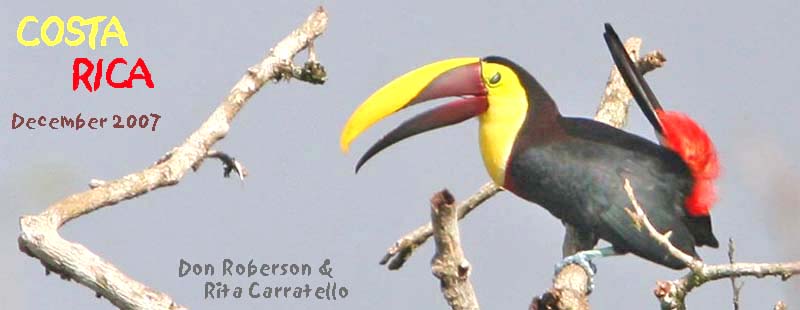
near Puerto Viejo 19 Dec 2007
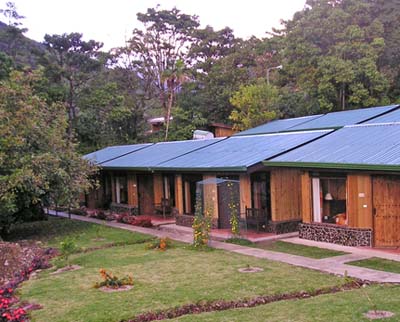 We spent two full days and two part-days between 21-24 December in the montane cloud forests around the very comfortable Savegre Mountain Lodge
(right), located at 2200m (7200') elevation in the San Gerardo Valley,
which stretches down the Pacific slope of the Talamanca Range from the
misty stunted forests on Cerro de la Muerte (3491m = 11,453'). We had
arranged with Alex Martinez to drive us there after the Atlantic
lowlands, and had arranged a taxi to take us to the Osa Peninsula when
we left, but we didn't have transportation while at Savegre. The hotel,
though, arranged one ride and two other guests, Jack & Debbie Heald
from Atlanta, graciously gave us a lift at other times. We spent two full days and two part-days between 21-24 December in the montane cloud forests around the very comfortable Savegre Mountain Lodge
(right), located at 2200m (7200') elevation in the San Gerardo Valley,
which stretches down the Pacific slope of the Talamanca Range from the
misty stunted forests on Cerro de la Muerte (3491m = 11,453'). We had
arranged with Alex Martinez to drive us there after the Atlantic
lowlands, and had arranged a taxi to take us to the Osa Peninsula when
we left, but we didn't have transportation while at Savegre. The hotel,
though, arranged one ride and two other guests, Jack & Debbie Heald
from Atlanta, graciously gave us a lift at other times. |
||||||||||||||
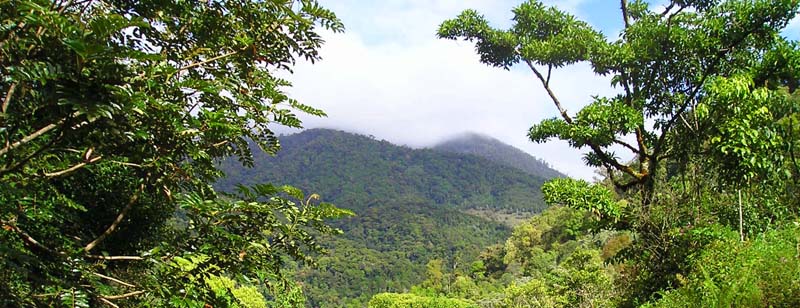 |
||||||||||||||
 |
||||||||||||||
One benefit of getting to the fruiting tree very early on the second day was that a Black Guan (below) was also feeding there. This can be a very elusive species in the cloud forest. |
||||||||||||||
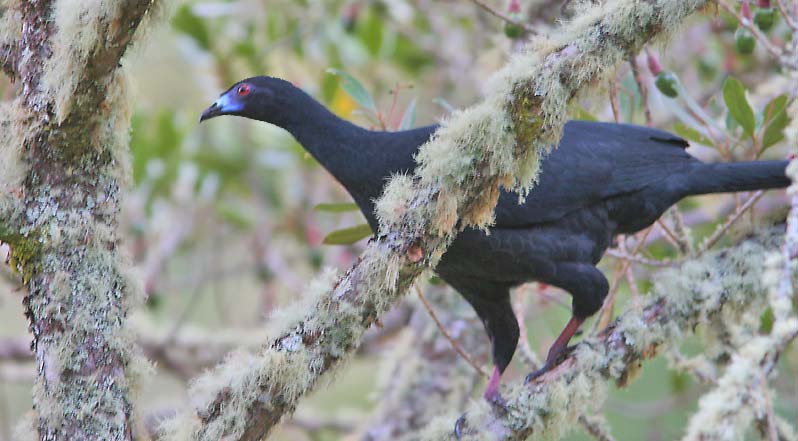 |
||||||||||||||
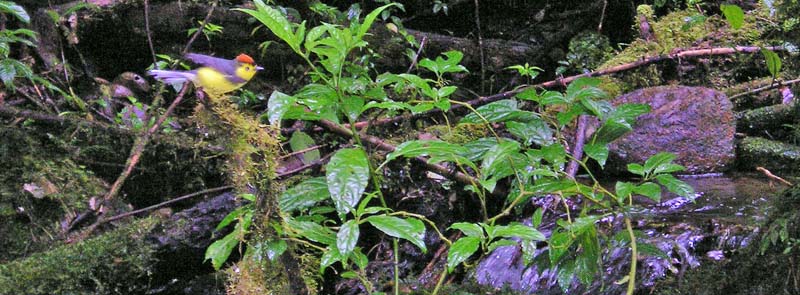 |
||||||||||||||
Hummingbirds were great at Savegre, and a selection of them appears on another page. The gallery below shows other montane species around Savegre Lodge.
|
||||||||||||||
|
||||||||||||||
One other surprise at Savegre was the discovery that the Quetzal Educational Research Center, a field center of Southern Nazarene University, is adjacent to the Lodge. We had a nice discussion with David Hille, the resident manager, and was surprised to meet Santa Cruz birder Matthew Strusis-Timmer visiting there as well. We can gladly recommend Savegre Mountain Lodge to anyone, and we thank Tim Manolis for telling us about this spot in the first place. They raise trout in pens next to the river below the lodge, and the trout dinners were superb! |
||||||||||||||
INTRODUCTION TO COSTA RICA TRIP Dec 2007 |
|
Atlantic Lowlands LA SELVA |
|
Montane Cloud Forest SAVEGRE |
HERPS Reptiles & Amphibians |
Pacific Lowlands RIO TIGRE |
ODES Dragonflies & Damselflies |
Complete TRIP LIST with birds, mammals & herps |
|
page created 23-25 Jan 2008
|
© Don Roberson 2007 |
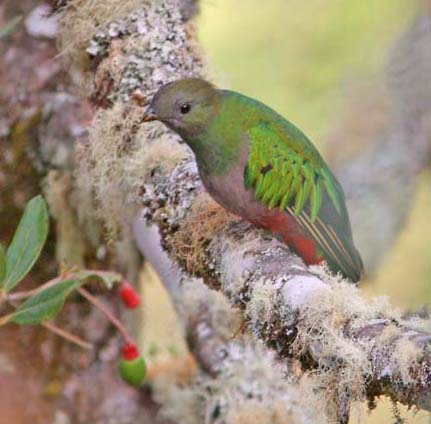 The foremost target at Savegre for us was Resplendent Quetzal.
Initially we were told they were 3 km up the road, and we hiked up that
way but saw none. We learned that night that one needed directions to a
specific fruiting tree, located on private land where everyone pays $1,
and that information was critical. The next morning the lodge drove us
to the spot and we saw 3 males and 2 females (one shown, right), and
watched a male engage in an impressive display flight out over the
valley (above). The next morning we went back with the Healds much
earlier, set up for photography, and got much better photos (see
The foremost target at Savegre for us was Resplendent Quetzal.
Initially we were told they were 3 km up the road, and we hiked up that
way but saw none. We learned that night that one needed directions to a
specific fruiting tree, located on private land where everyone pays $1,
and that information was critical. The next morning the lodge drove us
to the spot and we saw 3 males and 2 females (one shown, right), and
watched a male engage in an impressive display flight out over the
valley (above). The next morning we went back with the Healds much
earlier, set up for photography, and got much better photos (see 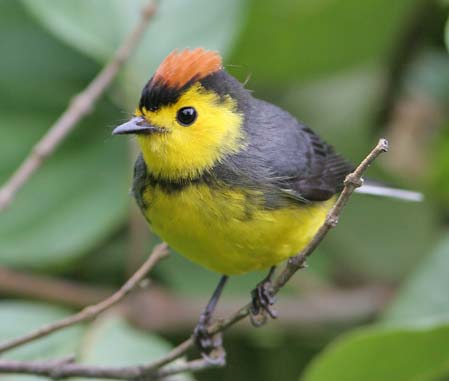 There
are a series of trails through the cloud forest above Savegre, and one
afternoon I spent most of it on the Quebrada Trail which parallels a
rushing montane stream for some distance (above). This is a primary
locale for Wrenthrush, which I saw along the edge of the creek after
sufficient effort (although tapes seemed to have no effect). I also
worked through the foraging flocks, some of which included Collared Redstart
(above & right). One canopy flock had Black-cheeked Warbler, Ruddy
Treerunner, and, most unexpectedly, three young or female
Black-and-yellow Silky-flycatchers. These flycatched out from canopy
branches for awhile, and then lingered over some berries as the flock
left them far behind.
There
are a series of trails through the cloud forest above Savegre, and one
afternoon I spent most of it on the Quebrada Trail which parallels a
rushing montane stream for some distance (above). This is a primary
locale for Wrenthrush, which I saw along the edge of the creek after
sufficient effort (although tapes seemed to have no effect). I also
worked through the foraging flocks, some of which included Collared Redstart
(above & right). One canopy flock had Black-cheeked Warbler, Ruddy
Treerunner, and, most unexpectedly, three young or female
Black-and-yellow Silky-flycatchers. These flycatched out from canopy
branches for awhile, and then lingered over some berries as the flock
left them far behind. 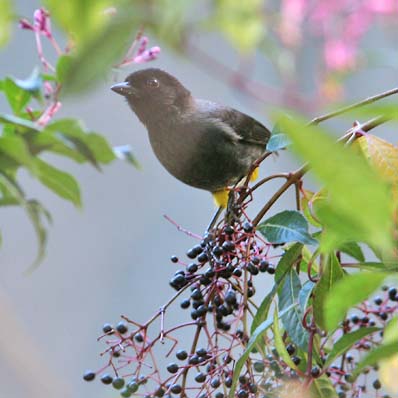
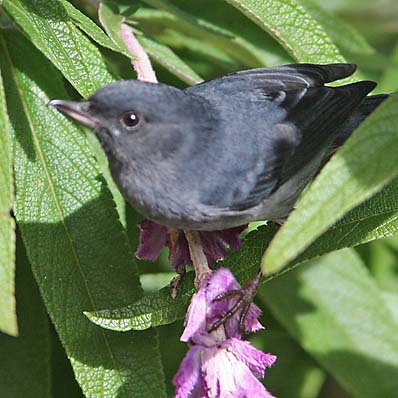
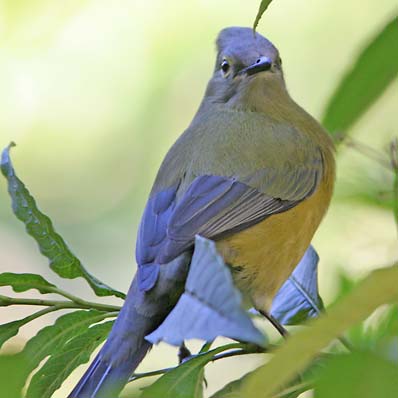
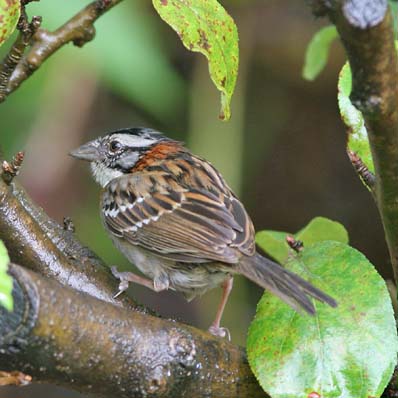
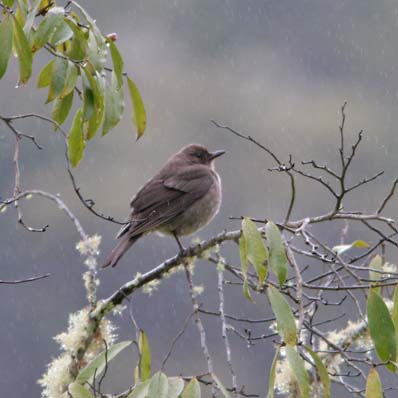
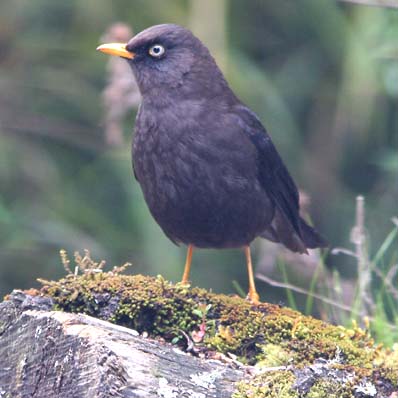
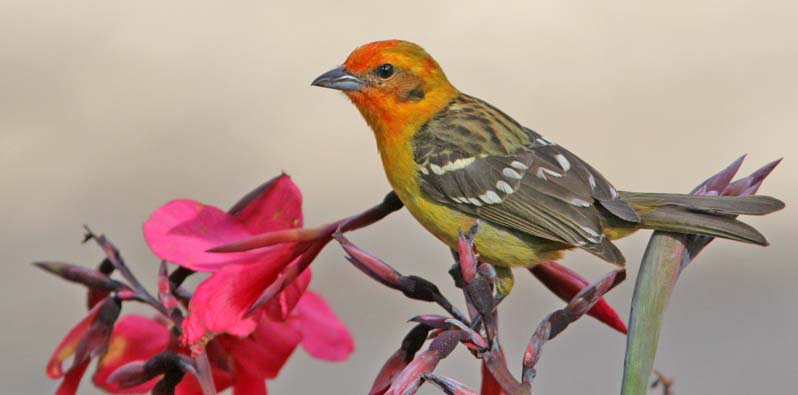
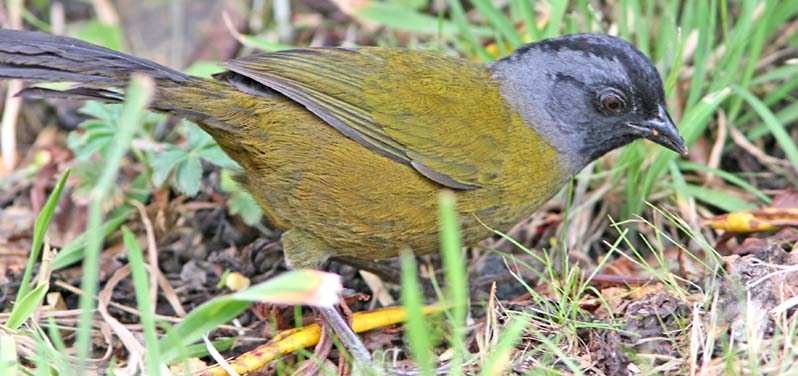
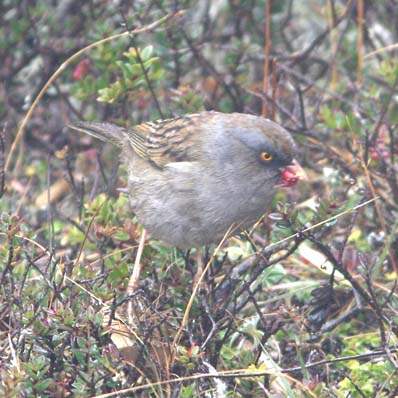 We traversed the PanAmerican Highway that crosses the Cerro de la Muerte
three times, two of them in thick wet fog, and the other just before a
rainstorm. This limited our attempts to locate the very high elevation
species, but we did find Flame-throated Hummingbird (shown on
We traversed the PanAmerican Highway that crosses the Cerro de la Muerte
three times, two of them in thick wet fog, and the other just before a
rainstorm. This limited our attempts to locate the very high elevation
species, but we did find Flame-throated Hummingbird (shown on